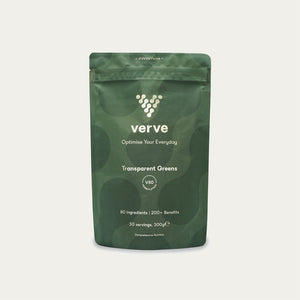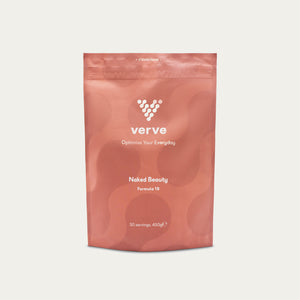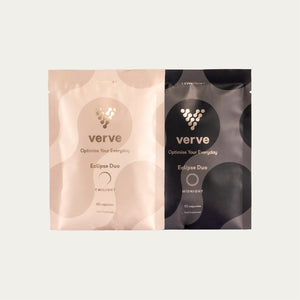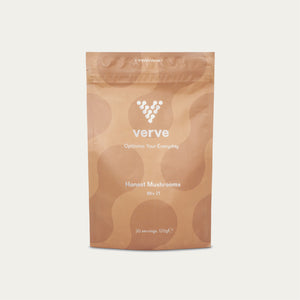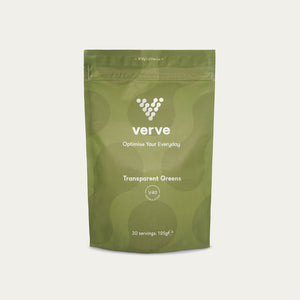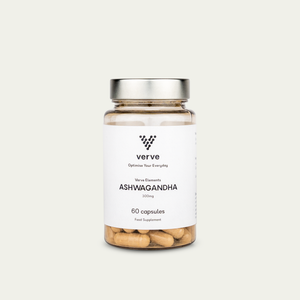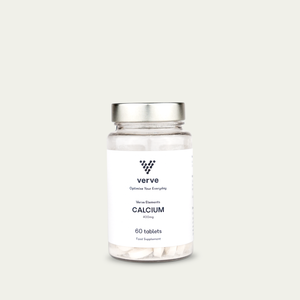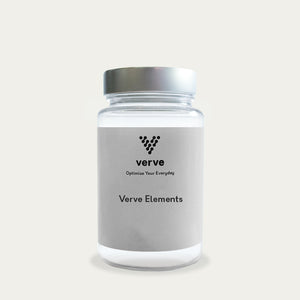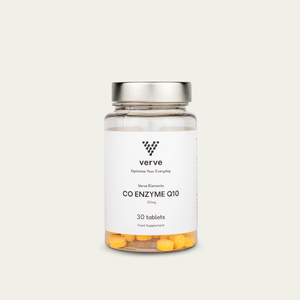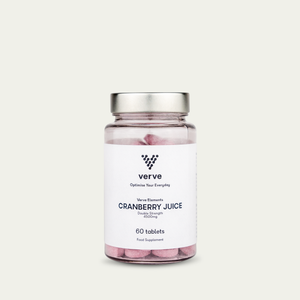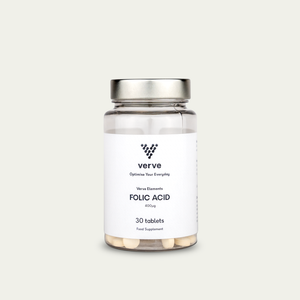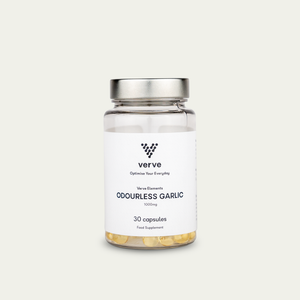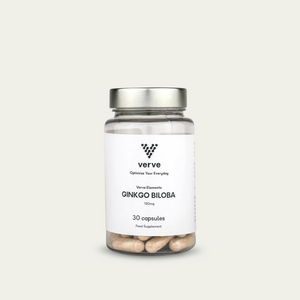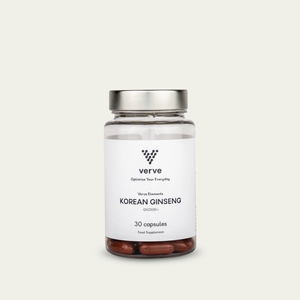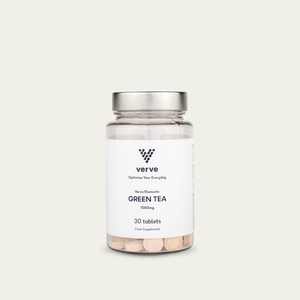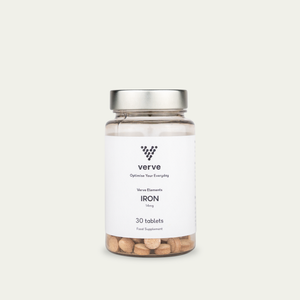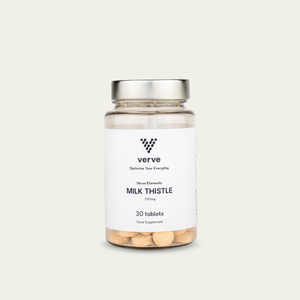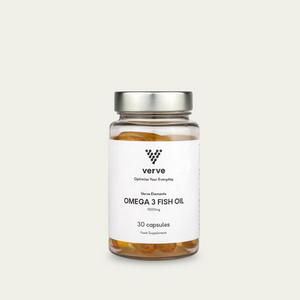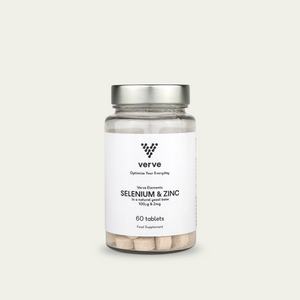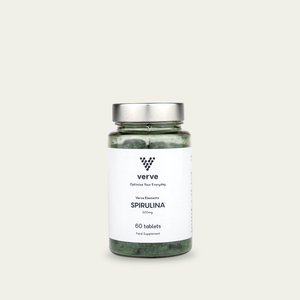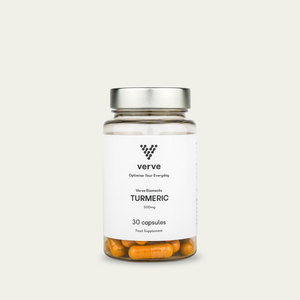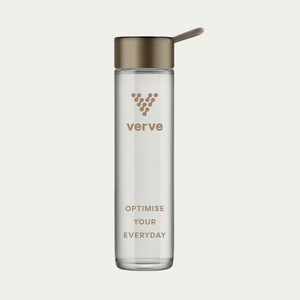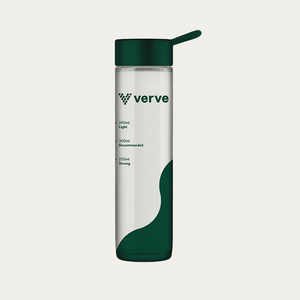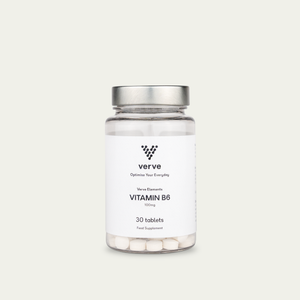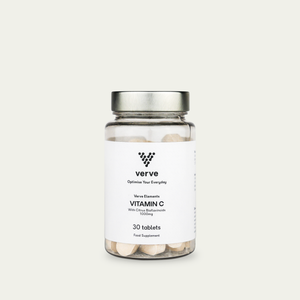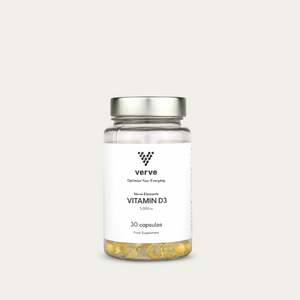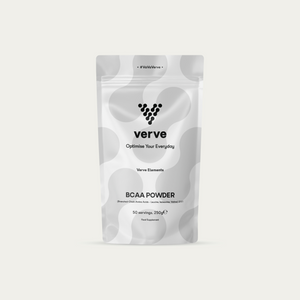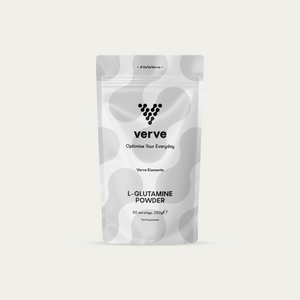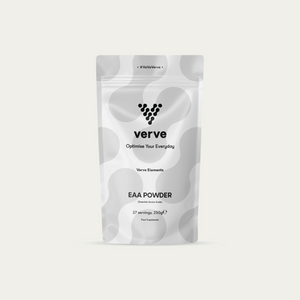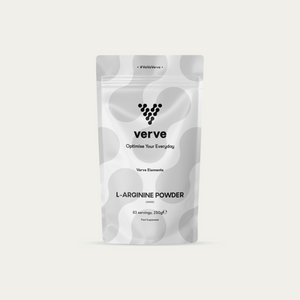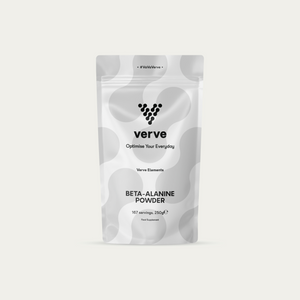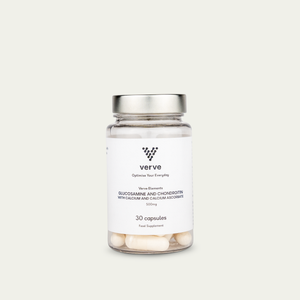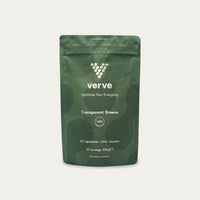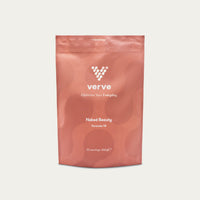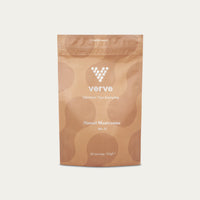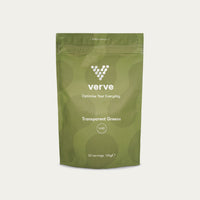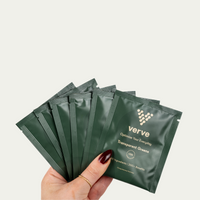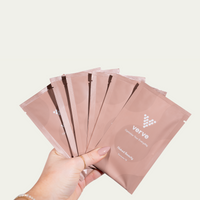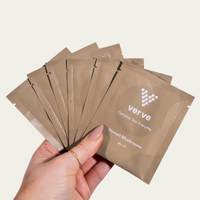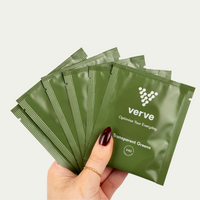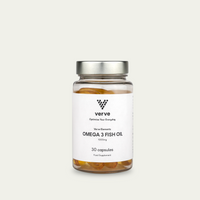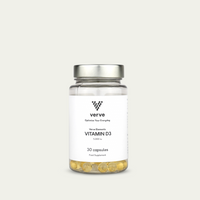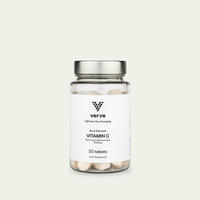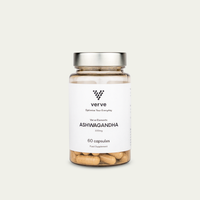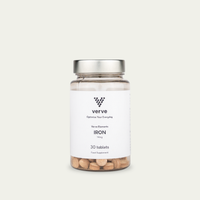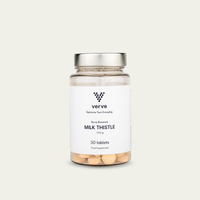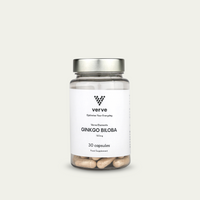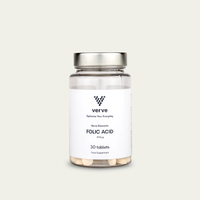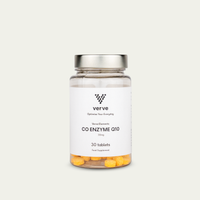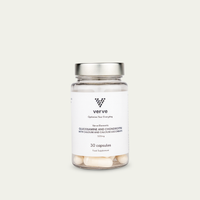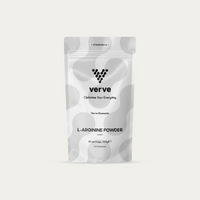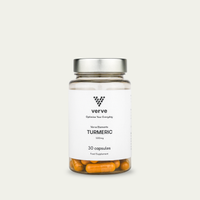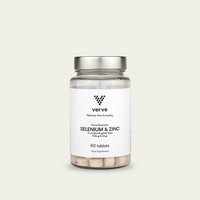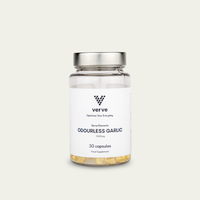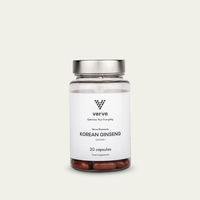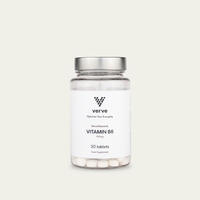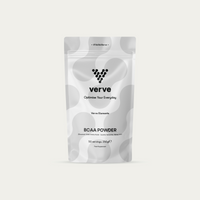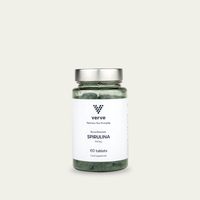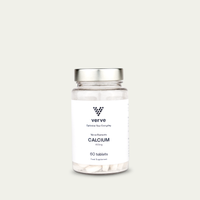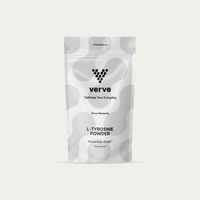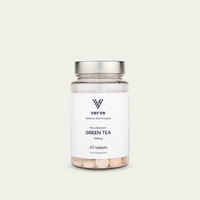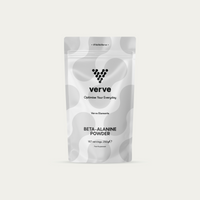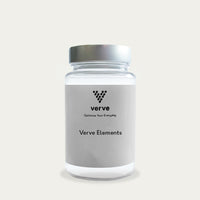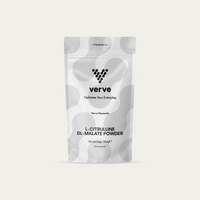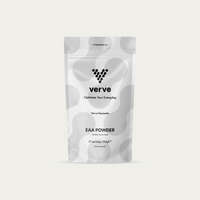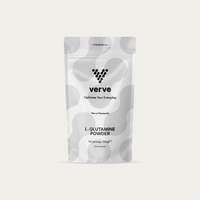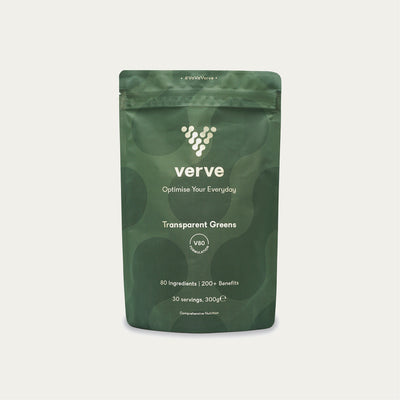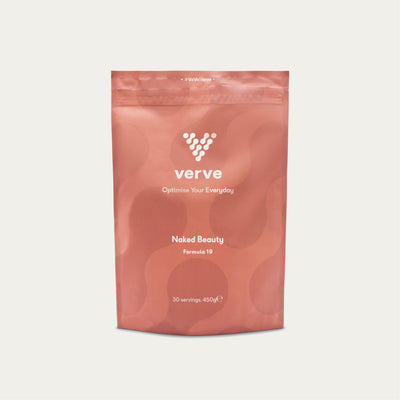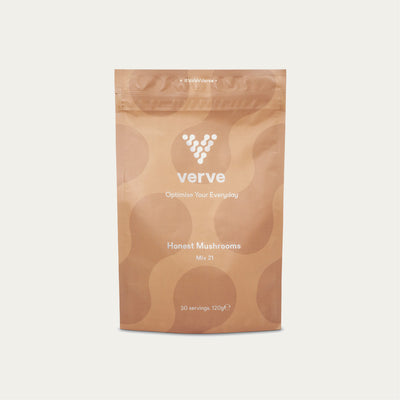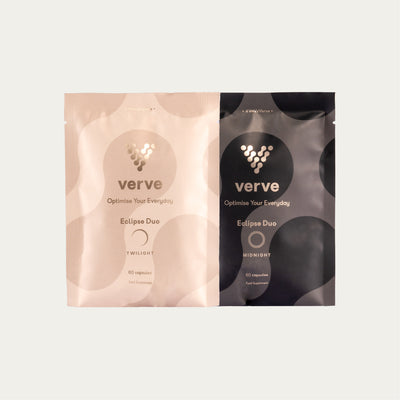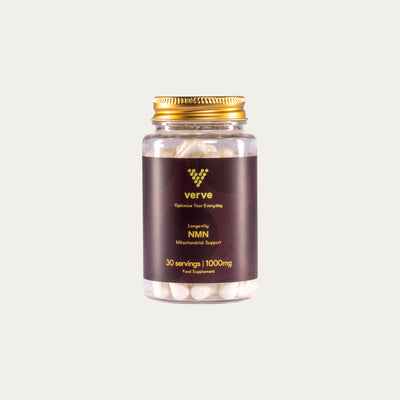Nutrition Fact Sheet
Verve Ingredients & Benefits
One of the things that sets Verve apart is our belief in 100% transparency. Our unique blends have been developed with all natural ingredients and formulated to work synergistically making the benefits greater than the sum of its parts.
- - -
The Health Benefits of V80
1. Biotin
What it does: Contributes to normal energy-yielding metabolism
2. Biotin
What it does: Contributes to normal functioning of the nervous system
3. Biotin
What it does: Contributes to normal macronutrient metabolism
4. Biotin
What it does: Contributes to normal psychological function
5. Biotin
What it does: Contributes to the maintenance of normal hair
6. Biotin
What it does: Contributes to the maintenance of normal mucous membranes
7. Biotin
What it does: Contributes to the maintenance of normal skin
8. Calcium
What it does: Contributes to normal blood clotting
9. Calcium
What it does: Contributes to normal energy-yielding metabolism
10. Calcium
What it does: Contributes to normal muscle function
11. Calcium
What it does: Contributes to normal neurotransmission
12. Calcium
What it does: Contributes to the normal function of digestive enzymes
13. Calcium
What it does: Has a role in the process of cell division and specialisation
14. Calcium
What it does: Needed for the maintenance of normal bones
15. Calcium
What it does: Needed for the maintenance of normal teeth
16. Chromium
What it does: Contributes to normal macronutrient metabolism
17. Chromium
What it does: Contributes to the maintenance of normal blood glucose levels
18. Copper
What it does: Contributes to maintenance of normal connective tissues
19. Copper
What it does: Contributes to normal energy-yielding metabolism
20. Copper
What it does: Contributes to normal functioning of the nervous system
21. Copper
What it does: Contributes to normal hair pigmentation
22. Copper
What it does: Contributes to normal iron transport in the body
23. Copper
What it does: Contributes to normal skin pigmentation
23. Copper
What it does: Contributes to the normal function of the immune system
25. Copper
What it does: Contributes to the protection of cells from oxidative stress
26. Folate
What it does: Contributes to maternal tissue growth during pregnancy
27. Folate
What it does: Contributes to normal amino acid synthesis
28. Folate
What it does: Contributes to normal blood formation
29. Folate
What it does: Contributes to normal homocysteine metabolism
30. Folate
What it does: Contributes to normal psychological function
31. Folate
What it does: Contributes to the normal function of the immune system
32. Folate
What it does: Contributes to the reduction of tiredness and fatigue
33. Folate
What it does: Has a role in the process of cell division
34. Magnesium
What it does: Contributes to a reduction of tiredness and fatigue
35. Magnesium
What it does: Contributes to electrolyte balance
36. Magnesium
What it does: Contributes to normal energy-yielding metabolism
37. Magnesium
What it does: Contributes to normal functioning of the nervous system
38. Magnesium
What it does: Contributes to normal muscle function
39. Magnesium
What it does: Contributes to normal protein synthesis
40. Magnesium
What it does: Contributes to normal psychological function
41. Magnesium
What it does: Contributes to the maintenance of normal bones
42. Magnesium
What it does: Contributes to the maintenance of normal teeth
43. Magnesium
What it does: Has a role in the process of cell division
44. Manganese
What it does: Contributes to normal energy-yielding metabolism
45. Manganese
What it does: Contributes to the maintenance of normal bones
46. Manganese
What it does: Contributes to the normal formation of connective tissue
47. Manganese
What it does: Contributes to the protection of cells from oxidative stress
48. Niacin
What it does: Contributes to normal energy-yielding metabolism
49. Niacin
What it does: Contributes to normal functioning of the nervous system
50. Niacin
What it does: Contributes to normal psychological function
51. Niacin
What it does: Contributes to the maintenance of normal mucous membranes
52. Niacin
What it does: Contributes to the maintenance of normal skin
53. Niacin
What it does: Contributes to the reduction of tiredness and fatigue
54. Pantothenic acid
What it does: Contributes to normal energy-yielding metabolism
55. Pantothenic acid
What it does: Contributes to normal mental performance
56. Pantothenic acid
What it does: Contributes to normal synthesis and metabolism of steroid hormones, vitamin D and some neurotransmitters
57. Pantothenic acid
What it does: Contributes to the reduction of tiredness and fatigue
58. Phosphorus
What it does: Contributes to normal energy-yielding metabolism
59. Phosphorus
What it does: Contributes to normal function of cell membranes
60. Phosphorus
What it does: Contributes to the maintenance of normal bones
61. Phosphorus
What it does: Contributes to the maintenance of normal teeth
62. Potassium
What it does: Contributes to normal functioning of the nervous system
63. Potassium
What it does: Contributes to normal muscle function
64. Potassium
What it does: Contributes to the maintenance of normal blood pressure
65. Protein
What it does: Contributes to a growth in muscle mass
66. Protein
What it does: Contributes to the maintenance of muscle mass
67. Protein
What it does: Contributes to the maintenance of normal bones
68. Riboflavin (Vitamin B2)
What it does: Contributes to normal energy-yielding metabolism
69. Riboflavin (Vitamin B2)
What it does: Contributes to normal functioning of the nervous system
70. Riboflavin (Vitamin B2)
What it does: Contributes to the maintenance of normal mucous membranes
71. Riboflavin (Vitamin B2)
What it does: Contributes to the maintenance of normal red blood cells
72. Riboflavin (Vitamin B2)
What it does: Contributes to the maintenance of normal skin
73. Riboflavin (Vitamin B2)
What it does: Contributes to the maintenance of normal vision
74. Riboflavin (Vitamin B2)
What it does: Contributes to the normal metabolism of iron
75. Riboflavin (Vitamin B2)
What it does: Contributes to the protection of cells from oxidative stress
76. Riboflavin (Vitamin B2)
What it does: Contributes to the reduction of tiredness and fatigue
77. Selenium
What it does: Contributes to normal spermatogenesis
78. Selenium
What it does: Contributes to the maintenance of normal hair
79. Selenium
What it does: Contributes to the maintenance of normal nails
80. Selenium
What it does: Contributes to the normal function of the immune system
81. Selenium
What it does: Contributes to the normal thyroid function
82. Selenium
What it does: Contributes to the protection of cells from oxidative stress
83. Thiamine
What it does: Contributes to normal energy-yielding metabolism
84. Thiamine
What it does: Contributes to normal functioning of the nervous system
85. Thiamine
What it does: Contributes to normal psychological function
86. Thiamine
What it does: Contributes to the normal function of the heart
87. Vitamin A
What it does: Contributes to normal iron metabolism
88. Vitamin A
What it does: Contributes to the maintenance of normal mucous membranes
89. Vitamin A
What it does: Contributes to the maintenance of normal skin
90. Vitamin A
What it does: Contributes to the maintenance of normal vision
91. Vitamin A
What it does: Contributes to the normal function of the immune system
92. Vitamin A
What it does: Has a role in the process of cell specialisation
93. Vitamin B12
What it does: Contributes to normal energy-yielding metabolism
94. Vitamin B12
What it does: Contributes to normal functioning of the nervous system
95. Vitamin B12
What it does: Contributes to normal homocysteine metabolism
96. Vitamin B12
What it does: Contributes to normal psychological function
97. Vitamin B12
What it does: Contributes to normal red blood cell formation
98. Vitamin B12
What it does: Contributes to the normal function of the immune system
99. Vitamin B12
What it does: Contributes to the reduction of tiredness and fatigue
100. Vitamin B12
What it does: Has a role in the process of cell division
101. Vitamin B6
What it does: Contributes to normal cysteine synthesis
102. Vitamin B6
What it does: Contributes to normal energy-yielding metabolism
103. Vitamin B6
What it does: Contributes to normal functioning of the nervous system
104. Vitamin B6
What it does: Contributes to normal homocysteine metabolism
105. Vitamin B6
What it does: Contributes to normal protein and glycogen metabolism
106. Vitamin B6
What it does: Contributes to normal psychological function
107. Vitamin B6
What it does: Contributes to normal red blood cell formation
108. Vitamin B6
What it does: Contributes to the normal function of the immune system
109. Vitamin B6
What it does: Contributes to the reduction of tiredness and fatigue
110. Vitamin B6
What it does: Contributes to the regulation of hormonal activity
111. Vitamin C
What it does: Contributes to maintain the normal function of the immune system during and after intense physical exercise
Caveat: Food provides a daily intake of 200mg of vitamin C. Information shall be given to the consumer that the beneficial effect is obtained with a daily intake of 200 mg in addition to the recommended daily intake of vitamin C.
112. Vitamin C
What it does: Contributes to normal collagen formation for the normal function of blood vessels
113. Vitamin C
What it does: Contributes to normal collagen formation for the normal function of bones
114. Vitamin C
What it does: Contributes to normal collagen formation for the normal function of cartilage
115. Vitamin C
What it does: Contributes to normal collagen formation for the normal function of gums
116. Vitamin C
What it does: Contributes to normal collagen formation for the normal function of skin
117. Vitamin C
What it does: Contributes to normal collagen formation for the normal function of teeth
118. Vitamin C
What it does: Contributes to normal energy-yielding metabolism
120. Vitamin C
What it does: Contributes to normal functioning of the nervous system
121. Vitamin C
What it does: Contributes to normal psychological function
122. Vitamin C
What it does: Contributes to the normal function of the immune system
123. Vitamin C
What it does: Contributes to the protection of cells from oxidative stress
124. Vitamin C
What it does: Contributes to the reduction of tiredness and fatigue
125. Vitamin C
What it does: Contributes to the regeneration of the reduced form of vitamin E
126. Vitamin C
What it does: Increases iron absorption
127. Vitamin D
What it does: Contributes to normal absorption/utilisation of calcium and phosphorus
128. Vitamin D
What it does: Contributes to normal blood calcium levels
129. Vitamin D
What it does: Contributes to the maintenance of normal bones
130. Vitamin D
What it does: Contributes to the maintenance of normal muscle function
131. Vitamin D
What it does: Contributes to the maintenance of normal teeth
132. Vitamin D
What it does: Contributes to the normal function of the immune system
133. Vitamin D
What it does: Has a role in the process of cell division
134. Vitamin E
What it does: Contributes to the protection of cells from oxidative stress
135. Vitamin K
What it does: Contributes to normal blood clotting
136. Vitamin K
What it does: Contributes to the maintenance of normal bones
137. Zinc
What it does: Contributes to normal DNA synthesis
138. Zinc
What it does: Contributes to normal acid-base metabolism
139. Zinc
What it does: Contributes to normal carbohydrate metabolism
140. Zinc
What it does: Contributes to normal cognitive function
141. Zinc
What it does: Contributes to normal fertility and reproduction
142. Zinc
What it does: Contributes to normal macronutrient metabolism
143. Zinc
What it does: Contributes to normal metabolism of fatty acids
144. Zinc
What it does: Contributes to normal metabolism of vitamin A
145. Zinc
What it does: Contributes to normal protein synthesis
146. Zinc
What it does: Contributes to the maintenance of normal bones
147. Zinc
What it does: Contributes to the maintenance of normal hair
148. Zinc
What it does: Contributes to the maintenance of normal nails
149. Zinc
What it does: Contributes to the maintenance of normal skin
150. Zinc
What it does: Contributes to the maintenance of normal testosterone levels in the blood
151. Zinc
What it does: Contributes to the maintenance of normal vision
152. Zinc
What it does: Contributes to the normal function of the immune system
153. Zinc
What it does: Contributes to the protection of cells from oxidative stress
154. Zinc
What it does: Has a role in the process of cell division
155. Cinnamon
What it does: Glucose Metabolism
Helps to maintain a healthy blood sugar level
156. Aloe Vera
What it does: Helps to support digestion
Helps to promote bowel regularity
157. Aloe Vera
What it does: Has beneficial effect in fatigue
Helps to stimulate metabolism
158. Aloe Vera
What it does: Helps to increase immunity
159. Aloe Vera
What it does: Helps maintain healthy skin/ epithelial layer
160. Spirulina
What it does: Is a rich source of antioxidants that help the body to protect against the consequences of oxidative stress
161. Spirulina
What it does: Assists in supporting the immune system
162. Ashwaganda
What it does: Helps to maintain physical and mental capacities in cases of weakness, exhaustion, tiredness, and loss of concentration
Contributes to optimal mental and cognitive activity
163. Ashwaganda
What it does: Supports in periods of mental and nervous tension and of anxiousness
Helps to support relaxation, mental and physical wellbeing
Contributes to emotional balance and general wellbeing
164. Ashwaganda
What it does: Beneficially affects the heart and cardiovascular system
165. Ashwaganda
What it does: Helps the body to deal with stress
Helps maintain mental balance
Supports the onset of sleep
Supports learning, memory and recall
166. Curcuma longa rhizome
What it does: Helps to keep the skin healthy
167. Curcuma longa rhizome
What it does: Helps to maintain the efficacy of the immune system
Has significant antioxidant properties
168. Ginger
What it does: Helps to support digestion
Contributes to the normal function of intestinal tract
Contributes to physical well being
169. Ginger
What it does: Helps maintain feeling of comfort, prevents feelings of sickness while using vehicles
170. Artichoke
What it does: Helps to support digestion
Contributes to the normal function of intestinal tract
Contributes to intestinal comfort
171. Rosehip
What it does: Helps increase joint mobility
Helps maintain healthy and flexible joints
172. Blueberry
What it does: Maintain eye health and function through antioxidant and venous support action
Supports visual clarity
Maintains eye health
Supports blood flow to the eye
Well known source of antioxidants
Natural defence against free radicals
173. Blueberry
What it does: Used for the good circulation of blood in microvessels
174. Flaxseeds
What it does: Used to facilitate the digestion
Contributes to digestive comfort
175. Flaxseeds
What it does: Helps to maintain normal bowel function
Good for a healthy stomach and digestive system
Please note although this is an “on-hold” claim, EFSA have determined 25g intake a day is required for normal bowel function
176. Aged Garlic
What it does: Contributes to normal immune function
177. Aged Garlic
What it does: Maintenance of heart health
Maintenance of normal cholesterol levels
Maintenance of normal homocysteine levels
178. Extract of Olive Leafs
What it does: Natural antioxidant protect organism from oxidative damage powerful antioxidants beneficial to human health
179. Green Tea Extract
What it does: Mental state and performance
Improves concentration and learning
180. Green Tea
What it does: Helps to strengthen the body
Supports energetic alertness
Has stimulating and tonic properties that contribute to the resistance against mental and physical fatigue
181. Green Tea
What it does: Camellia sinensis has beneficial antioxidant properties
182. Inulin
What it does: Gut Health. There is a cause and effect relationship has been established between the consumption of “native chicory inulin” and maintenance of normal defecation by increasing stool frequency
183. Panax Ginseng:
What it does: Immune Health. Ginseng contributes to the natural defences
184. Panax Ginseng
What it does: Helps to promote alertness
185. Panax Ginseng
What it does: Helps to promote vitality
186. Panax Ginseng
What it does: Helps to counteract fatigue
187. Panax Ginseng
What it does: Contributes to normal blood circulation, which is associated with brain performance and reactivity
188. Panax Ginseng
What it does: Helps to maintain good cognitive performance
Supports memory performance
189. Grape
What it does: Helps improve the overall health and appearance of the skin
190. Grapeseed
What it does: Circulatory health through antioxidant action
Maintains healthy blood vessels & capillary integrity
Natural defence against free radicals
Maintains normal cell health & function
191. Ginkgo Biloba
What it does: Helps the maintenance of good cognitive function
192. Ginkgo Biloba
What it does: Blood system microcirculation
193. Ginkgo Biloba
What it does: Contains naturally occurring antioxidants
Antioxidants help protect you from free radicals
Antioxidants help protect your cells and tissues from oxidation
Antioxidants contribute to the total antioxidant capacity of the body and may help strengthen our body's defences
194. Bilberry
What it does: Improves ocular circulation; it regulates (slows down) accelerated intestinal transit
It sustains the digestive apparatus
It protects the gastric mucous and slowing down the intestine transit
The chromium and flavonoids have a blood sugar-reducing effect
195. Gotu Kola
What it does: Helps maintain venous circulation
196. Gotu Kola
What it does: Helps to maintain a good cognitive performance
197. Iodine
What it does: Contributes to normal cognitive function
198. Iodine
What it does: Contributes to normal energy-yielding metabolism
199. Iodine
What it does: Contributes to normal functioning of the nervous system
200. Iodine
What it does: Contributes to the maintenance of normal skin
201. Iodine
What it does: Contributes to the normal production of thyroid hormones and normal thyroid function
202. Milk Thistle
What it does: Supports liver health
Helps to maintain the liver function and additionally promote the digestion and the body´s purification
203. Astragalus membranaceus
What it does: Supports the natural defences
204. Guarana
What it does: Guarana and mental performance
Ginseng helps to sustain physical and mental vitality
205. Guarana
What it does: Guarana strengthens immunity
Helps to suppress fatigue
Supports metabolism
Protection against derogative influence of stress and surroundings
Stimulating effects
206. Rosemary
What it does: Rosemary is rich in the antioxidants carnosic and carnosol
207. Rosemary
What it does: Contributes to the natural defences of the body
Support of the body´s defence
Supports the immune system
208. Rosemary
What it does: Invigoration of the body
Helps to strengthen the body
Helps you feel more energetic
209. Glycyrrhiza glabra root
What it does: Helps to maintain balance and comfort in the digestive systems of people with sensitive digestions
210. Piper nigrum
What it does: Helps to maintain natural digestive functions
211. Piper nigrum fruit
What it does: Supports appetite, digestion and absorption of nutrients
Helps to digest toxins
Eclipse Duo (additional claims)
212. Hawthorn (Crataegus laevigata)
What it does: Helps to find a better sleep
Helps to decrease restlessness
213. Hawthorn (Crataegus laevigata)
Improves oxygen flow and peripheral blood circulation
214. Chamomile
Contributes to optimal relaxation
Helps to support relaxation and mental and physical well-being
Helps to maintain a healthy sleep
215. Hops
Soothing effect for the nervous system
216. Hops
Promotes good sleep
217. Lavender
Relaxation
218. Lemon Balm
Support calmness and to help onset sleep
Contributes to optimal relaxation
Contributes to a normal/ helps to maintain a healthy sleep
Contributes to a good and calm rest
219. Lemon Balm
Support calmness and to help sleep onset
Helps normalise/promote sleep (onset)
220. Lemon Balm
Acts as an antioxidant
Helps preventing oxidative damage
221. Lemon Balm
Contributes to optimal relaxation
222. Lemon Balm
Used to help to find a better sleep
Used to decrease tenseness
Used to decrease restlessness
Used to decrease irritability
223. Passionflower
Induces a state of calm
Increase body resistance to stress
Favours obtaining a restful sleep
224. Passionflower
Helps to induce calm rest and sleep
Recommended to people feeling weak and fatigued
Helps to induce relaxation
225. Saffron
Contributes to emotional balance
Helps to support the relaxation
Helps to maintain a positive mood
Honest Mushrooms (additional claims)
226. Ashwagandha
Contributes to optimal mental and cognitive activity
227. Ashwagandha
Supports in periods of mental and nervous tension and of anxiousness
Contributes to optimal relaxation
Helps to support relaxation, mental and physical wellbeing
Contributes to emotional balance and general wellbeing
228. Ashwagandha
Beneficially affects the heart and cardiovascular system
229. Ashwagandha
Improves the body's resistance to stress
Helps the body to deal with stress
Helps maintain mental balance
Supports mental function in the elderly
Supports the onset of sleep
Supports learning, memory and recall
Helps you recover from stressful events
Helps maintain emotional stability
230. Ashwagandha
Helps maintain energy levels
Helps you gain weight and muscle mass
Energy tonic/Invigoration of the body
Helps to maintain optimal stamina, feelings of energy and vitality, physical and mental well-being
Helps to support the body´s vitality
Helps to make you feel more energetic
231. Ashwagandha
Helps maintain the health of the respiratory system
232. Ashwagandha
Has a general rejuvenating effect
233. Ashwagandha
Supports the health of the female reproductive organs
Helps maintain strength in pregnancy
Supports male sexual function
Helps maintain sperm mobility and sperm count
234. Ashwagandha
Helps maintain the health of the skin
235. Ashwagandha
Protect tissue from injuries
Protect the general health by antioxidant activity
236. Schisandra berry
Schizandra has adaptogenic properties
May increase a person’s ability to adapt to stress
237. Schisandra berry
Tonic that contributes to the adaptogenic activity
238. Schisandra berry
Tonic for the support of mental and well-being
239. Schisandra berry
Can protect cells and tissues against oxidative damage
240. Schisandra berry
Contributes to the upper respiratory tract health
241. Schisandra berry
Hepatoprotective
242. Rhodiola
Helps organisms adapt for emotional stress, physical effort
Helps stimulate the nervous system
Has beneficial effect in fatigue and headaches induced by stress
Beneficial for the sleep difficulties, poor appetite, decline in work performance
Helps to stimulate perception, improve state of mind, helps to support potency
Has beneficial effect on cardiovascular system because it helps to protect against stress and hypertension
243. Rhodiola
Golden root helps maintain normal function of the circulatory system, in this way providing cells with oxygen and nutrients
244. Rhodiola
Contributes to normal blood circulation, which is associated with brain performance and reactivity
Contributes to optimal mental and cognitive activity
245. Rhodiola
For the gastrointestinal tract health
Normalises intestinal tract function
246. Bacopa Monnieri
May help to improve concentration and memory
Helps the maintenance of good cognitive function
Helps to maintain memory with age decline and to preserve cognitive function
Helps the peripheral blood microcirculation
Contributes to normal blood circulation, which is associated with brain performance
247. Bacopa Monnieri
Contains a high amount of naturally occurring antioxidants. Antioxidants help protect you from radicals which can cause cell damage in the brain. Antioxidants help protect the cells and tissues of your brain from oxidative damage.
248. Bacopa Monnieri
Helps to the normal function of gallbladder
249. Bacopa Monnieri
Bacopa monnieri might have a positive effect on the brain system, might have short- and long-term memory enhancing effects, might help to increase concentration, intelligence. Bacopa monnieri might be helping to relieve and prevent stress, is needed for healthy dream
250. Bacopa Monnieri
Contributes to good nervous balance
Promotes good mental balance
251. Ginkgo Biloba
Helps the maintenance of good cognitive function
Helps to maintain memory with age decline and to preserve cognitive function
Enhancement of cognitive performance
252. Ginkgo Biloba
Blood system microcirculation
253. Ginkgo Biloba
Contains naturally occuring antioxidants
Antioxidants help protect you from free radicals
Antioxidants help protect your cells and tissues from oxidation
Antioxidants contribute to the total antioxidant capacity of the body and may help strengthen our body's defences
254. Ginkgo Biloba
Promotes the peripheral circulation, which is especially useful for the eyes and the ears
Contributes to good hearing and vision
255. Ginkgo Biloba
Can help the maintenance of the proper brain performance in elderly people
Naked Beauty (additional claims)
256. Grapeseed
Supports venous circulation
- Maintains healthy blood vessels & capillary integrity
- Well known source of antioxidants
- Natural defence against free radicals
- Maintains normal cell health & function
257. Grapeseed
Antioxidants help protect the body cells from radicals which cause cell damage
Antioxidants help protect the body cells and tissues from oxidative damage
258. Grapeseed
Clinically/scientifically proven to improve the overall health and appearance of the skin
259. Grapeseed
Clinically/scientifically proven to maintain heart, cardiovascular and vessel health, supports metabolism
Contributes to a beneficial effect on blood pressure
Advisory Information.
We go to great efforts to ensure that the information on this page is accurate at the time of writing. We work hard to ensure that the information provided reflects the current consensus of the medical community and regulating bodies. Consumers, particularly those that suffer from allergies and intolerances, should always check product labelling before consumption. If you have any concerns then please check with your healthcare professional prior to consumption.
On Hold Claim Key
Benefit Number/On Hold Claim Number
155/2013, 156/3721, 157/2634, 158/2635, 159/1995, 160/1867, 161/1876, 162/3657, 163/2183, 164/2503, 165/4194, 166/4008, 167/4009, 168/2172, 169/2506, 170/3703, 171/4328, 172/2050, 173/2347, 176/1990, 177/1991, 178/2668, 179/2812, 180/1274, 181/1276, 182/1924, 183/3672, 184/3673, 185/3674, 186/3675, 187/3668, 188/3870, 189/2158, 190/2139, 191/3768, 192/4304, 193/4499, 194/3742, 195/3700, 201/3821, 202/3735, 203/2062, 204/3372, 205/2866, 206/3882, 207/3883, 208/4052, 209/2116, 211/2109, 212/2250, 213/2789, 214/2088, 215/4419, 216/3710, 217/3925, 218/2301, 219/2848, 220/3712, 221/3713, 222/2302, 223/4717, 224/2636, 225/2038, 226/3657, 227/2183, 228/2503, 229/4194, 230/4195, 231/4196, 232/4197, 233/4198, 234/4199, 235/4507, 236/4142, 237/3580, 238/3581, 239/3818, 240/3819, 241/3820, 242/2659, 243/2376, 244/3877, 245/2484, 246/3986, 247/4324, 248/4361, 249/2650, 250/2546, 251/3768, 252/4304, 253/3767, 254/2807, 255/2369, 256/2139, 257/2144, 258/2145, 259/2146
